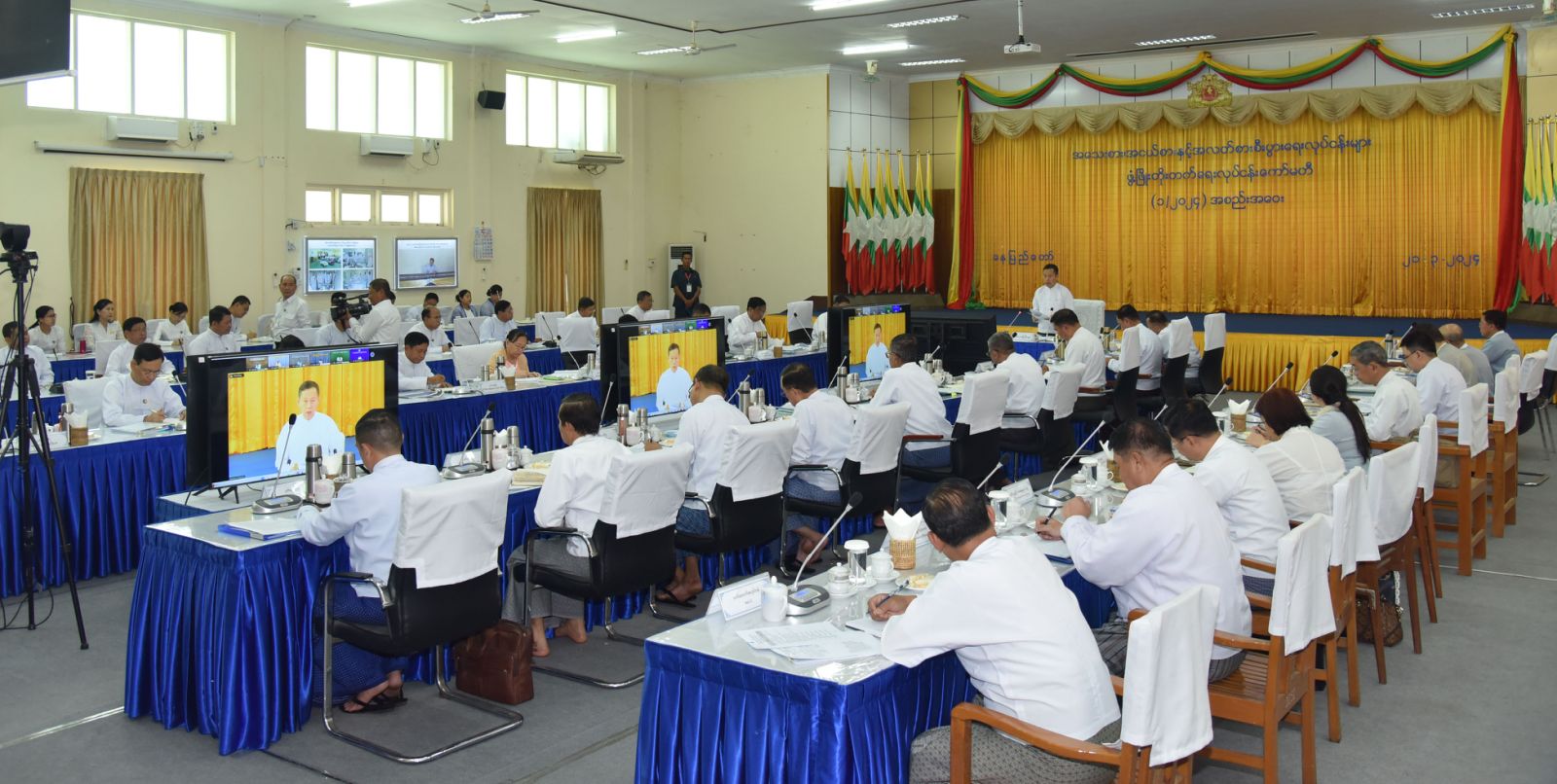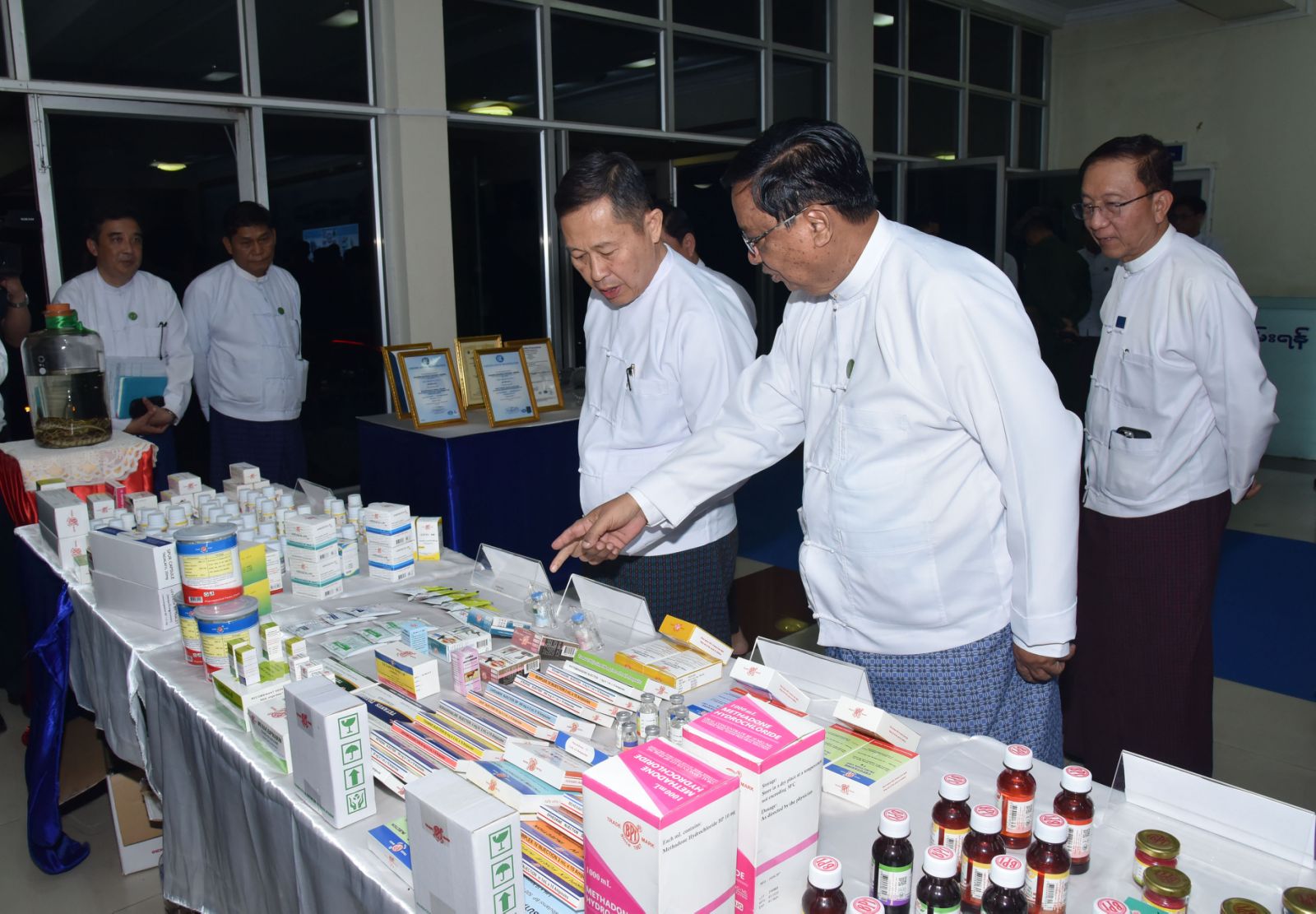SAC Vice Chairman Deputy Prime Minister Vice-Senior General Soe Win addresses MSME Development Work Committee meeting 1/2024
MSME Development Work Committee held meeting 1/2024 at the Ministry of Industry here this afternoon addressed by Work Committee Chairman Vice Chairman of State Administration Council Deputy Prime Minister Vice-Senior General Soe Win.
Present were Deputy Prime Minister Union Minister for Planning and Finance U Win Shein and union ministers Dr Kan Zaw, U Hla Moe, Dr Charlie Than, U Tun Ohn, and Dr Myo Thein Kyaw, the Nay Pyi Taw Council chair, deputy ministers, work committee members, and officials or associations.
Region/state chief ministers attended the meeting through video conferencing.
The Vice-Senior General said the relevant ministries, organizations, local governments and agencies are implementing the minutes of the committee's third meeting through coordination.
The goal of this fourth meeting is to realize the directives of the SAC Chairman Prime Minister, which are, promotion of farming-based valued added production, sector-wise provision of needs of the production chain, turning products into exports, national economic development through increase in per capita income triggered by production growth, extension of edible oil and dairy products output, and production of skilled labour for human resources development, through collective ideas. The meeting would serve as a driving force for the ministries/ organizations and agencies to fully realize the resolutions of the committee and to adopt future work programs The nation is now striving with earnest efforts for the resurgence of its economy. Encouragement of MSMEs is one of the many priority sectors for economic development.
MSME involves businesses all along the production chain starting from the farming production sector. Encouragement of MSMEs will develop the national economy and generate job opportunities for citizens as they serve as the foundation and core of the task.
The SAC has adopted two political goals – to strengthen disciplined and genuine democracy and to build a Union based on democracy and federalism; two national goals – national prosperity and food sufficiency – as the visions of the State. It also adopted the five-point roadmap and nine objectives including three economic objectives to support the visions.
Region-wise farming-based value added goods must be manufactured by using local raw materials of various origins.
Priority must be given to export those valued-added goods. Ministries have listed 612 categories of farming-based original products and value-added products in four sectors. The country will be able to increase trade value and income by turning local goods into value-added goods. Exports will earn foreign exchange and increase GDP.
Production of marketable value-added goods will generate job opportunities for rural people and develop socio-economy.
If local goods can be turned into exports by adding value to them, the country will be free from depending on exports and stabilize its market. An action plan for 107 kinds of products is under implementation to realize the One Region One Product project proposed by regions and states. Of them, 57 have been chosen as priority goods. In prioritizing 57 of them, connections will be made with the work plan on farming-based products.
It is necessary to offer support for further development and long-term prospects of MSMEs in order to boost the economy of the country in accordance with the economic objectives of the country. Efforts must be made to achieve economic progress by manufacturing many products for the people by MSMEs in respective areas.
Therefore, MSMEs are urged to manufacture products based on raw materials that are available in the country with emphasis on fulfilling the needs for security of food, water and basic needs and then value-added products for exports.
The Prime Minister has held 23 meetings with MSMEs entrepreneurs in regions and states to promote them and I have met them five times.
During the meetings, it was found that the entrepreneurs reported on their needs in respective sectors including the needs for technology, capital investment, markets, raw materials, machinery and land.
In the reports, two factors are land and capital investment.
When value-added products are manufactured from local raw materials, capital investment is the essential need. The government has set up funds for economic promotion of the country and development of MSMEs and measures are being taken to provide financial support for MSMEs. When entrepreneurs apply for MSME loans, relevant ministries/organizations and regional agencies are required to cooperate in accordance with the standard procedure and offer MSME loans granted by the government to entrepreneurs who really need them.
To catch up with the changing global economic models today, it can be seen that technologies relating to digital transformation play an important role in economic growth and development of MSMEs. Measures must be adopted and taken for digital transformation of MSME entrepreneurs, linking them to international business networks and enhancement of digital capabilities. For the development of MSMEs, The work committee and respective agencies are required to offer assistance to establish Incubation Centers to promote startup businesses, to increase the number of entrepreneurs, to boost innovation and competitiveness.
In the market economic system, as market linkages and market development are the essential lifeblood for survival of MSMEs, relevant agencies are required to take measures for development of markets and commodity exchanges in respective areas.
Furthermore, relevant ministries are required to continue to conduct training courses to produce skilled laborers and human resources, which are essential for MSMEs. And It was found that 350 categories of training courses have so far been conducted 4,395 times since January, 2022, and 91,807 trainees have completed the courses and 3,862 trainees are still attending the courses. Continued efforts must be made to nurture more skilled laborers for relevant industries and sectors.
Members of the work committee are urged to report difficulties, advantages and disadvantages in implementing potential products under the OROP Action Plan in respective regions and states, MSME promotion plans, industrial linkage plans, linkages between MSME entrepreneurs and industrial zones and establishing digital corners in MSME exhibition and competitions, all of which were discussed and approved in previous meetings.
It is necessary to support the foundation MSMEs such as raw materials that can be guaranteed, required inputs, technologies, capital investment and human resources development in encouraging MSMEs and skilled laborers necessary for MSMEs must be nurtured under the TVET programs and skills required to keep up with the times must be developed.
Myanmar's economic development heavily relies on a strong production sector, particularly a well-functioning manufacturing industry. This industry can create high-quality jobs that lift people out of poverty and contribute to overall economic productivity growth.
The role of well-managed MSMEs is crucial for the development of manufacturing activities.
To further enhance this sector's contribution, I propose we conduct a comprehensive review of its strengths and weaknesses.
This can be achieved through a dedicated work committee.
The findings from this committee, along with research conducted by experts and scholars in relevant ministries and associations, will provide valuable data for the government to develop a more effective production sector plan. This meeting presents an ideal platform for initiating such discussions.
Given Myanmar's market economy, fostering a supportive environment for private businesses is essential to ensure they can meet the nation's production needs.To achieve this, relevant ministries, regional governments, agencies, private associations, and central and work committees must collaborate effectively. They should implement existing policy guidelines effectively, work diligently towards developing the MSME sector and openly discuss challenges and areas for improvement identified by the work committee and businesses themselves. This includes analyzing the sector's strengths and weaknesses to inform future strategies.
Next, Work Committee Secretary Deputy Minister for Industry U Yin Maung Nyunt explained preparations for the resolution of the meeting (2/2023) and the committee’s ongoing activities.
Then, U Yin Maung Nyunt, Deputy Minister for Planning and Finance Daw Than Than Lin, Deputy Minister for Labour U Win Shein and chief ministers of Kachin, Mon and Shan states submitted and read messages to the work committee.
Work Committee Vice Chairman Union Minister for Planning and Finance U Win Shein explained financial data and rules regarding loans disbursed to MSMEs.
Work Committee Vice Chairman Union Minister for Industry Dr Charlie Than explained MSME development efforts, implementation of the guidelines and instructions from the SAC Chairman by relevant ministries and government organizations and future tasks.
Then, Work Committee members Union Ministers Dr Kan Zaw, U Hla Moe, U Tun Ohn and Dr Myo Thein Kyaw, Nay Pyi Taw Council Chairman U Than Tun Oo, state/region chief ministers, deputy ministers and officials from organizations reported thier operations for MSME developemnt.
Afterwards, the Vice-Senior General coordinated the discussions and gave a conclude remark. Later, the Vice-Senior General and party made a tour of the displays showing the Industry Ministry’s activities and products.



